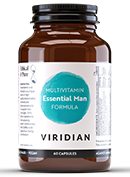
Viridian Essential Man Formula 60 Capsules
So what is the essential man Multivitamin formula ?
Essential Man Formula Multivitamin provides the full spectrum of essential vitamins and trace elements to support men aged 18-50.
The unique blend of high-quality bioavailable nutrients and botanical extracts help maintain energy and vitality. Vitamin B5 contributes to the reduction of tiredness and fatigue as well as normal mental performance. The addition of selenium contributes to normal spermatogenesis and immune function.
Research shows the importance of a balanced B vitamin intake especially of vitamins B2, B6, and B12 to support normal energy-yielding metabolism and the functioning of the nervous system. Furthermore, male health is supported by antioxidant nutrients, these include zinc, vitamin C, vitamin E, vitamin D, copper, selenium and manganese.
This advanced formula also features Maca (Lepidium meyenii), a radish-like root vegetable native to Peru that is often referred to as a superfood. It has been shown to support physical and mental health through maintaining optimal stamina and vitality.
Two capsules provide:
| Ingredient | Weight | %EC NRV |
|
Maca (equivalent to 800mg maca root) |
200mg | |
|
Vitamin B5 (Calcium d-patothenate) |
100mg | 1666 |
|
Iodine (from Kelp and potassium iodide) |
150ug | 100 |
|
Potassium (as citrate) |
40mg | 2 |
|
Vitamin C (as magnesium and calcium ascorbate) |
130mg | 163 |
|
Magnesium (as citrate and ascorbate) |
8mg | 2 |
|
Calcium (as citrate and ascorbate) |
10mg | 1 |
|
Natural Beta Carotene Eqivalent to Vitamin A (833ug) |
5mg | 104 |
|
Lycopene (from tomato extract) |
5mg | |
|
Zinc (as citrate) |
15mg | 150 |
|
Vitamin E Natural (D-Alpha Tocopherol Succinate) (50IU) |
33mg | 275 |
|
Vitamin B1 (as thiamine HCI) |
25mg | 2272 |
|
Vitamin B3 (as nicotinamide) |
25mg | 156 |
|
Vitamin B2 (as riboflavin) |
25mg | 1786 |
|
Co-enzyme Q10 |
25mg | |
|
Pine bark extract (95% OPCs) |
20mg | |
|
Selenium (as methionine) |
50ug | 90 |
|
Vitamin B6 (as pyridoxine HCI) |
10mg | 714 |
|
Choline (as bitartrate) |
5mg | |
|
Vitamin K2 (MK-7) |
20ug | 27 |
|
Molybdenum |
20ug | 40 |
|
Inositol |
5mg | |
|
Iron (as bisglycinate) |
1mg | 7 |
|
Vitamin D3 (Vegan) (400IU) |
10ug | 200 |
|
Manganese (as citrate) |
1mg | 50 |
|
Boron (as sodium tetraborate) |
500ug | |
|
Chromium (as picolinate) |
100ug | 250 |
|
Copper (as citrate) |
1mg | 100 |
|
Folic acid |
400ug | 200 |
|
Biotin |
50ug | 100 |
|
Vitamin B12 (as adenosylcobalamin and methylcobalamin) |
50ug | 2000 |
Maca
(equivalent to 800mg maca root)
Vitamin B5 (Calcium d-patothenate)
Iodine (from Kelp and potassium iodide)
Potassium (as citrate)
Vitamin C (as magnesium and calcium ascorbate)
Magnesium (as citrate and ascorbate)
Calcium (as citrate and ascorbate)
Natural Beta Carotene
Eqivalent to Vitamin A (833ug)
Lycopene (from tomato extract)
Zinc (as citrate)
Vitamin E Natural (D-Alpha Tocopherol Succinate) (50IU)
Vitamin B1 (as thiamine HCI)
Vitamin B3 (as nicotinamide)
Vitamin B2 (as riboflavin)
Co-enzyme Q10
Pine bark extract (95% OPCs)
Selenium (as methionine)
Vitamin B6 (as pyridoxine HCI)
Choline (as bitartrate)
Vitamin K2 (MK-7)
Molybdenum
Inositol
Iron (as bisglycinate)
Vitamin D3 (Vegan) (400IU)
Manganese (as citrate)
Boron (as sodium tetraborate)
Chromium (as picolinate)
Copper (as citrate)
Folic acid
Biotin
Vitamin B12 (as adenosylcobalamin and methylcobalamin)
